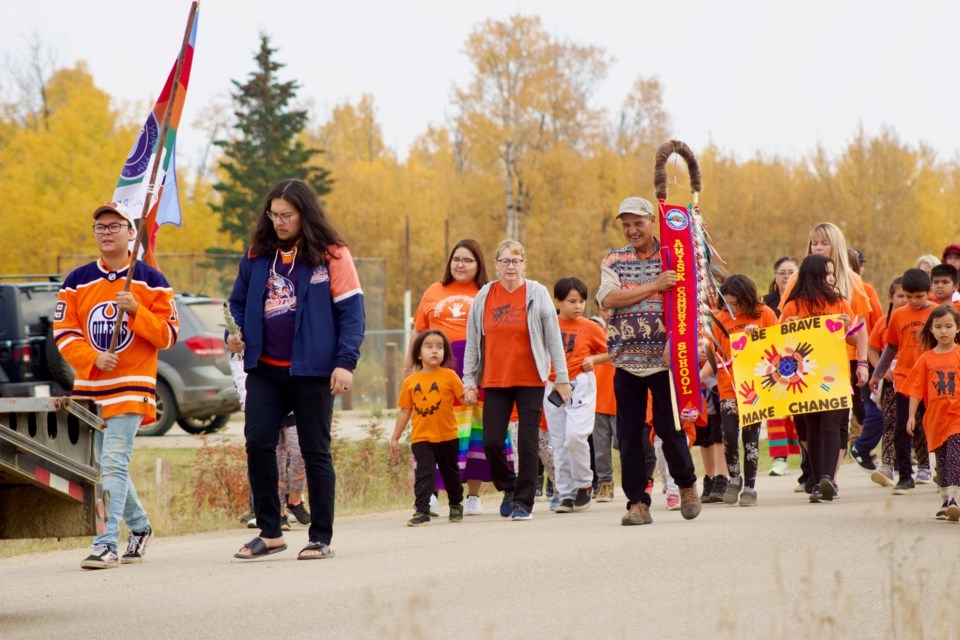LAC LA BICHE - On Sept. 30, Canadians from coast to coast can recognize the tragic legacy of residential schools during the National Day for Truth and Reconciliation. At the same time, annual Orange Shirt Day activities will also draw awareness to the issue.
In Lac La Biche, the National Day for Truth and Reconciliation will begin with an awareness walk organized by the Buffalo Lake Métis Settlement. The walk will be held in Lac La Biche and begins at 9:30 a.m. at the downtown Value Drug Mart. The procession will lead up to the Bold Centre, where attendees will participate in events sponsored by Lac La Biche County FCSS.
Some of those events will include an Elder’s Prayer provided by Emma Rayko, and speeches by members of Lac La Biche County council and representatives from Beaver Lake Cree Nation and Buffalo Lake Métis Settlement, as well as James Cardinal, the past-president of the Métis Nation of Alberta Region One, and Louis Bellrose, a survivor of Canada’s residential school system, will make presentations.
Community education
Jihad Moghrabi, the manager of marketing, communications and engagement for Lac La Biche County says municipal officials believe that acknowledging and educating residents about Canada’s tragic and unjust treatment of Indigenous peoples is an important step towards reconciliation.
“We host events like this each year to remind residents that listening to, engaging with, and honouring survivors’ stories is one of the many ways we can address the wrongs of the past and the present, and move towards a more positive future together,” he said.
Dianne Veillette of the Métis Nation of Alberta Region 1 office in Lac La Biche, says the annual event can be very emotional for presenters and the public.
“The survivors that may attend do speak, if they can. For some, the pain is too great to bear, and with all good intentions of sharing their stories, sometimes it just doesn’t happen as the emotions can be hard to control.”
Veillette says while there is a long way to go with regards to people truly understanding the magnitude of the trauma caused by the residential school system, the National Day for Truth and Reconciliation is playing a pivotal role in educating society about the wrongs of the past. In the case of many people taking part in the Lac La Biche event, the tragedies of the past played out very close to home.
“We have mixed feelings about the past. We know this happened, and respect and honour the aboriginal and Métis people who were taken from their families and placed in the local Indian Residential School known as the Oblate Mission,” she said. “It will take years for people to understand what really happened. We feel that in reality, our government tried to erase and remove the population of Indigenous people.”
Since it became a federally mandated day of recognition in 2021, the National Day for Truth and Reconciliation is celebrated in conjunction with Orange Shirt Day. The significance of the Orange Shirt is an Indigenous-led grassroots commemorative day intended to raise awareness of the generational impacts of residential schools, and to promote the concept of Every Child Matters.
“The orange shirt is a symbol of the stripping away of culture, freedom, and self-esteem experienced by Indigenous children over several generations,” Veillette continued. “To us, it is also a symbol of remembrance, as to wear an orange shirt is a way of honouring those who left their families but never came home.”
Veillette said the road to reconciliation begins with education and sharing knowledge through public schools and public events like the ones coming up. She added that learning about the legacy of Canada’s residential school system as well as Indigenous culture must be made part of educational curriculums.
“Children need to hear from the elders and listen to their stories,” she said. “The elders have that knowledge. This traumatic experience that they endured needs to be shared with the younger generation and it can only happen through the educational system.”
Veillette said as Canadian society changes and moves forward into the future, people must never lose sight of the past, nor the dark chapters of history-particularly the residential school system-meant to be erased nor forgotten.
“It is with open arms that Canada accepts refugees fleeing war-torn countries and embraces cultures from all over the world, but to stop and think about and reflect on what has happened to Indigenous and Métis people who were here first, to think that our government tried to wipe out a whole race, is very hard to comprehend,” she said. “We need to look to our future with understanding and passion, but also remember our history and where we came from in order for our society to thrive and to grow.”



